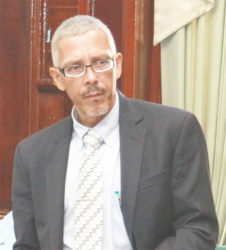Minister of Business Dominic Gaskin yesterday declared that he has full confidence in the Small Business Council whose performance over the year 2016 has been satisfactory though key targets remain elusive.
This confidence was expressed despite the fact that the Small Business Bureau (SBB) which is overseen by the council has failed to meet several targets of the Guyana REDD+ Invest-ment Fund’s (GRIF) “Micro and Small Enterprise Development (MSED) Building Alternative Livelihoods for Vulnerable Group” programme.

Though it has been implementing the programme for three years the bureau is still to disburse more than 80% of a targeted 800 loans under the programme, it has only disbursed 233 of a targeted 300 grants and has created and sustained only 735 jobs under both programmes. It was expected to have created and sustained 2,200 jobs.
The minister was speaking at the SBB end-of-year conference where it was revealed that the bureau had provided 56 loans at a total value of $224 million dollars between January to November 2016. This represented a significant increase over the 24 loans granted in 2015 and the 12 loans granted in 2014. Cumulatively over the life of the programme SBB has approved 95 loans valued at $392.3 million and disbursed 92.
Additional programme outcomes include the creation of 440 jobs under the loan component and 295 under the grant, a total of 735. The expected outcome however was 2,200 jobs.
Credit Grantee Fund Manager of SBB, Gillian Edwards-Griffith explained to media operatives that SBB has seen a significant increase in the number of loans its credit partners Republic Bank Limited (RBL) and Guyana Bank for Trade and Industry (GBTI) have been willing to commit to. They have however found it difficult to persuade other financial institutions to partner with them in covering the guarantee programme.
Changing this will be one of SBB’s main priorities in the New Year. According to Edwards-Griffith the bureau expects that more banks will come on board in 2017 once there is more public awareness and an improvement in the support services of SBB.
“SBB as viewed by clientele is expected to be a one stop shop for all business support services [additionally] feedback from the banks with respect to how cumbersome some small businesses find registering business name and NIS registration will be addressed with council,” she said adding that in 2017 a midterm evaluation of the bureau’s effectiveness will be conducted. The results of this evaluation will inform other improvements.
A press statement further explained that the SBB which was established in 2010 to promote policies and programmes which foster small business development was in its early days constrained by limited subvention funding, that is no longer the case and increased subventions have been followed by improved programme output. It explained that SBB has been granted subventions of $21.82 million in 2012, $22.97 million in 2013, $29.15 million in 2014, $31.57 million in 2015, 49.2 million in 2016 and a whopping $73 million for 2017.
These increased subventions were also bolstered by the GRIF programme in 2013, the implementation of which has allowed the bureau to fulfil its mandate of supporting MSEs “access to finance” as well as to deliver in a much more significant way programmes for enhanced “business management and technical skills”.
In the second area of this mandate SBB reports having trained some 2,500 person at a total cost of $179 million. The training offered is based on the identified need of the MSEs as requested and as identified from interactions with SBB officers. In 2013 at the beginning of the programme there were 3 providers of training that has since been expanded to 12, seven of whom delivered programmes in 2016.
Meanwhile, a total of 233 grants valued at $68.8 million have been provided under the Low Carbon Grant Scheme. This is a significant portion of the targeted 300 grants with 25 grants having been given in 2014, 136 in 2015 and 72 in 2016.
The SBB statement explained that while the increased demand for grants in 2015 had seen the SBB considering expanding the grant component to 500 loans, a realistic consideration of the time frame left for this extension; up to December 2017 it is expected that only 160 more grants will be awarded.





